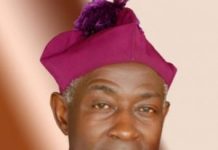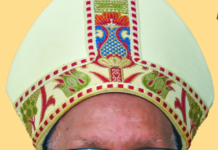The Episcopal Church’s Executive Council met Nov. 7-9 in New Brunswick, New Jersey.
This message is from the members of the Executive Council of The Episcopal Church to the church. It is not a news report. It is not minutes of the meeting. It is our attempt to bring you alongside us as we do our work, because we do it on your behalf.
—————————
Executive Council members gathered for our first meeting of this triennium as we still were reacting to the news of the election in the United States. As this group that includes immigrants, LGBTQ+ people, people of color, Indigenous people, White people, and folk from across the church organized to get our work done, emotions ran the gamut. A few were quietly pleased. Most were moving through anger, sadness, fear, and astonishment.
In her opening remarks, President of the House of Deputies and Council Vice Chair Julia Ayala Harris said, “As a woman, as a Latina, as the mother of a teenage girl, as the daughter of an undocumented immigrant from Mexico, holding leadership in this moment I feel the weight of our communities’ struggles. Our baptismal promise to ‘respect the dignity of every human being’ stands not as a political statement but as a divine calling, a gospel imperative that transcends partisan divisions.”
Presiding Bishop Sean Rowe’s opening remarks preceded Harris’. He said, “As I wrote to the church yesterday, regardless of our political allegiances, we must remember that God has called us in The Episcopal Church to seek and serve Christ in all persons. No matter the party in power, we are one church, and we will continue to fulfill our baptismal covenant by proclaiming in word and example the Good News of God in Christ, striving for justice and peace among all people and respecting the dignity of every human being.”
Rowe said supporting the work of Episcopal Migration Ministries in refugee resettlement is a “top priority,” as that agency expects funding cuts under the Trump administration’s anti-immigrant policies.
He referenced his request on the day he was elected that bishops and deputies think about the time between the election and this meeting as “a kind of relational jubilee, a time of letting go of the resentment, anger, and grudges that have too often weakened our leadership in this church.
“I hope that the way we treat one another here can be a witness to the power of the Good News of God in Christ, and we can build up the relationships we need for leading the church. And I hope that where we are divided, we can find the courage to forgive one another and begin again, for the sake of the Gospel of Jesus Christ.”
Not all members were ready to hear a request to let go of their anger. Others felt more time was needed to honor the feelings in the room and to process the results of the election. For some members of color, it felt like the old familiar trope of White people telling marginalized people to get over themselves, that their feelings were less important than getting done the work prioritized by White people.
So, exercises led by The Visions Group to try on norms for the meeting, which included a discussion of “intent versus impact,” were timely as council members agreed impact was more important than intent, and awareness of that reality is crucial to being able to truly hear and understand one another.
Presiding Bishop Rowe, in his opening remarks for the afternoon session, acknowledged that rage can be a weapon, and urged us to aim that rage at injustice.
He reminded us that what we do is in service of those hurting outside our doors and suggested that as we work on restructuring the work at the Church Center, we can build a vehicle to carry the work into the world. Strong institutional structures can be containers for transformation.
In discussion, members of color pointed out that different cultures express anger differently, sometimes in ways that may make some people uncomfortable, and that we need to work to be more culturally fluent with one another. No space is safe for everyone. When White people try to create such a space, it often is at the expense of the most marginalized in the room, who either are pressured into silence or simply resigned to being silenced.
Speakers acknowledged that the country is craving unity, and unity at the cost of being complicit with forces of oppression is a false unity.
To begin building community, we were invited to introduce ourselves, giving a one-word wish for the church. Offerings included: courage (3), unity (2), remember (2), love (2), flexibility (2), dignity, witness, joyful, equity, action, inclusive, depth, resilience, fearless, imagination, reckoning, strength, partnership, and stretch.
Chaplain Nancy Frausto said in her homily at the opening worship that afternoon:
“Our church is a mixture of languages, culturas, expressions, laughter and tears…our church is mestiza…the body of Christ who began as a scrappy bunch of believers who lived faithfully by the words and teachings of their compañero Jesús.
“Believers who I am sure disagreed, porque like, that’s humanity! We are not meant to agree on everything, but as the church we are called to love. Love is much more than a four-letter word hijacked by Hallmark and telenovelas. Love is an action. Love moves. Love transforms.
“Love demands we pay attention to whose voice is not present. El amor requiere que usemos nuestras voces. Love is clear that we keep our privilege and our suspicions in check. Love craves for us to be present, patient, and to extend grace to one another.”
The second day of the meeting began with Morning Prayer, and a homily in which the Rev. Cameron Partridge said:
“It strikes me as I listen and talk with you, that you are equipping yourselves together for this process of coming together to be about the work that God is calling us to do . . .This equipping process is a profound and humbling one, full of twists and turns, learning and listening, relearning, listening more deeply, turning and walking forward together.
“…all of us, lay and ordained, are called to be in this work together. All of our gifts, all of our unique differences, woven together in this shared equipping process, are crucial to what God would have us do in this moment and the days to come.”
As the work of council went on during the day, that weaving of gifts and differences also continued. We began to get to know one another, as some learned to be quiet and listen, and others gathered the courage to speak up. We got a little better at speaking slowly for the interpreters. We all struggled together to figure out the technology, which was great—until it wasn’t.
The day was a bit more relaxed than the first, perhaps because people got over the initial shock of the election or figured out coping mechanisms that allowed us to focus on the tasks at hand. It also helped that the task at hand was an engrossing one, as Compass, a consulting firm with experience in organizational development, walked us through an exercise on our future.
Presiding Bishop Rowe said, “We want to think about our vision for The Episcopal Church’s future using four quadrants: where we are going, why it matters, where we are now, and how we will get there.”
Where we are going is “a strong, adaptive church that communicates and embodies the depth of Christian spirituality and works toward The Episcopal Church’s vision of God’s kingdom by supporting ministry on the ground in dioceses.”
Why it matters is to “ensure that The Episcopal Church can make a strong and effective witness to the Gospel of Jesus Christ.”
Where we are now:
- Deep incarnational spirituality and inclusive theology centered on our relationship with God in Christ and with humanity
- Committed leaders eager to participate more effectively in God’s mission
- A significant lack of capacity at nearly every level
- A corporate structure that is turned inward and largely unaccountable
- Governance structures built for a bygone era
- Institutional atrophy and a lack of ability to think institutionally
How we will get there:
- Reorient churchwide structure to support dioceses
- Reform structure and governance while preserving polity
- Support innovative work to create capacity for mission
- Become a people who effectively embody and communicate the depth of Christian spirituality
- Measure impact and adapt accordingly
As each table worked to agree on the part of each section that most attracted them and on the best way to achieve those goals, spirited conversations ensued, helping to build mutual understanding and respect among the diverse people in each group.
This engagement continued through a discussion of the budget and committee assignments—during which members helped one another unravel the mysteries of exactly where various reports resided in Microsoft Teams (Microsoft’s team collaboration app) or in other web-based applications. It turns out that bonding through overcoming mutual tech-generated confusion is a thing.
As we gathered for our final day of meeting in our new committee assignments and voting on the last list of resolutions, the shape of this particular Executive Council is coming into view. It doesn’t “look like the church,” because The Episcopal Church is very White, and this council is pretty much half White and half people of the Global Majority. And we are finding some areas of common ground on which to stand together. Not that we are doing that alone.
As member Grecia Christian Reynoso of the Dominican Republic said, “Somos una iglesia movida por el Espíritu Santo.”
“We are a church moved by the Holy Spirit.”










